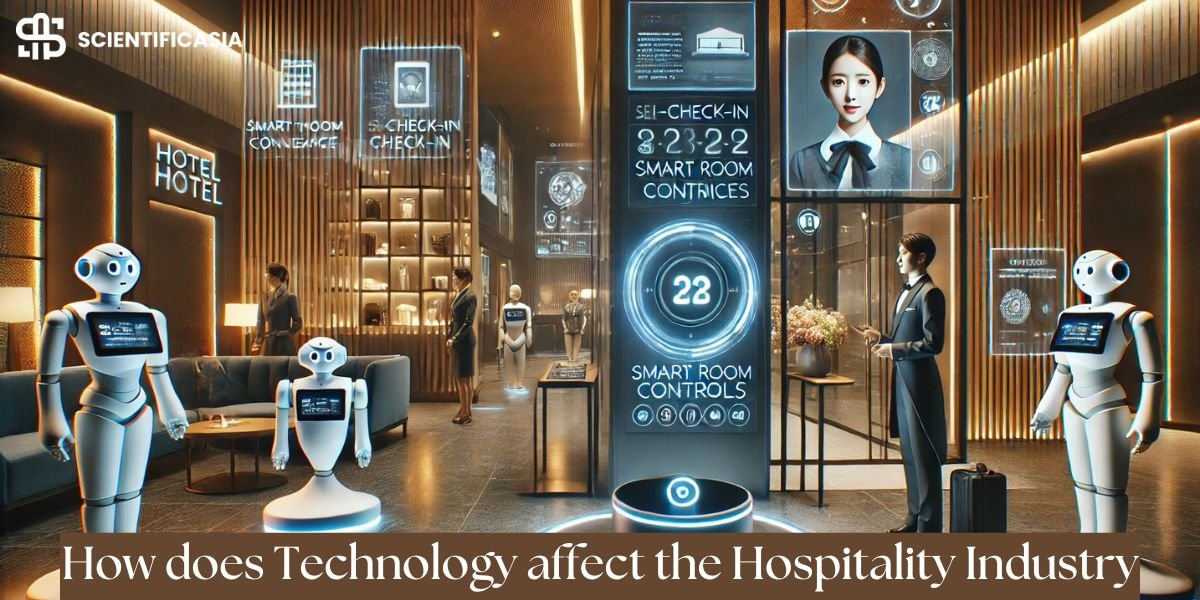The hospitality industry, a sector built on providing exceptional experiences, has undergone a dramatic transformation thanks to rapid technological advancements. From the moment a guest begins planning their trip to their post-stay feedback, technology is interwoven into every touchpoint, reshaping how businesses operate and how guests experience their stays. This article explores the key ways technology is impacting the hospitality landscape:
1. Enhanced Guest Experience:
Technology has empowered hospitality providers to personalize and elevate the guest experience to unprecedented levels.
- Personalization: Hotels and restaurants can now leverage data to understand guest preferences, from dietary restrictions to preferred room temperature. This allows for tailored offers, personalized recommendations, and proactive service, creating a sense of individual attention and fostering loyalty.
- Seamless Booking and Communication: Mobile apps and online platforms simplify the booking process, offering real-time availability, virtual tours, and easy access to concierge services. Chatbots and AI-powered virtual assistants handle inquiries, provide local information, and even manage requests like room service or spa bookings, 24/7.
- In-Room Technology: Smart room features like voice control, automated lighting, personalized entertainment systems, and high-speed Wi-Fi enhance comfort and convenience, allowing guests to customize their environment to their liking.
- Enhanced Amenities: From mobile check-in and digital keys to interactive maps and curated local guides accessible through in-room tablets, technology enhances the overall guest experience, providing convenience and information at their fingertips.
2. Streamlined Operations:
Behind the scenes, technology is revolutionizing how hospitality businesses operate, leading to increased efficiency and cost savings.
- Property Management Systems (PMS): These comprehensive systems integrate various aspects of operations, including reservations, check-in/check-out, room assignments, billing, and inventory management, automating tasks and improving overall efficiency.
- Revenue Management: Data analytics and sophisticated algorithms help optimize pricing strategies based on demand, seasonality, and competitor analysis, maximizing revenue potential.
- Staff Communication and Task Management: Mobile devices, messaging apps, and task management software facilitate seamless communication and coordination among staff, ensuring quick responses to guest requests and efficient task completion.
- Automation: Robots are being used for tasks like cleaning, delivering amenities, and even serving food, reducing labor costs and improving service consistency. AI In Hospitality Industry operations include AI-powered chatbots that handle routine inquiries, freeing up staff to focus on more complex tasks and guest interactions.
3. Online Booking and Marketing:
The internet has become the primary channel for travel planning and booking, making a strong online presence crucial for hospitality businesses.
- Online Travel Agencies (OTAs): Platforms like Booking.com and Expedia play a significant role in driving bookings, requiring hotels to manage their presence and pricing effectively.
- Direct Booking Channels: Hotels are increasingly focusing on driving direct bookings through their own websites and mobile apps, offering loyalty programs and exclusive deals to incentivize guests.
- Digital Marketing: Social media, search engine optimization (SEO), and targeted advertising are essential tools for reaching potential guests and promoting special offers.
- Online Reputation Management: Guest reviews on platforms like TripAdvisor and Google Reviews heavily influence booking decisions, making online reputation management a critical aspect of marketing.
4. Data-Driven Decision Making:
Technology provides access to vast amounts of data, which can be analyzed to gain valuable insights and make informed business decisions.
- Guest Data Analysis: Understanding guest preferences, booking patterns, and feedback allows hotels to personalize services, target marketing efforts, and improve overall guest satisfaction.
- Operational Data Analysis: Analyzing data related to occupancy rates, revenue, expenses, and staff performance can identify areas for improvement and optimize operations.
- Market Analysis: Tracking market trends, competitor activity, and customer demographics helps hotels make informed decisions about pricing, marketing, and service offerings.
5. Virtual and Augmented Reality (VR/AR):
VR and AR technologies are creating immersive experiences for potential guests and enhancing the on-site experience.
- Virtual Tours: VR tours allow guests to explore hotels and rooms before booking, providing a realistic preview of the property and its amenities.
- Augmented Reality Enhancements: AR can be used to provide guests with interactive maps, local guides, and information about hotel services through their smartphones.
- Gamification: AR can be used to create engaging experiences for guests, such as scavenger hunts or interactive games, enhancing their stay and creating memorable moments.
6. Sustainability and Green Technology:
Technology is playing a vital role in promoting sustainability and reducing the environmental impact of the hospitality industry.
- Energy Management Systems: Smart thermostats, automated lighting, and other energy management systems help reduce energy consumption and lower operating costs.
- Water Conservation: Technology is being used to monitor water usage, identify leaks, and implement water-saving measures.
- Waste Reduction: Digital menus, online check-in/check-out, and paperless billing help reduce paper waste.
7. Enhanced Security:
Protecting guest data and ensuring their safety is paramount. Technology plays a crucial role in enhancing security in the hospitality industry.
- Cybersecurity: Protecting guest data from cyberattacks is essential, requiring robust security systems and protocols.
- Surveillance Systems: CCTV cameras and other surveillance technologies help monitor public areas and ensure guest safety.
- Access Control: Electronic key cards and biometric access systems enhance security and prevent unauthorized access to guest rooms and other areas.
8. Impact on Employment:
While technology has brought numerous benefits to the hospitality industry, it has also raised concerns about its impact on employment.
- Automation and Job Displacement: Automation of certain tasks, such as check-in/check-out and cleaning, may lead to job displacement in some areas.
- Upskilling and Reskilling: The industry needs to invest in training and development to equip employees with the skills needed to work alongside new technologies.
- New Job Opportunities: While some jobs may be displaced, technology also creates new job opportunities in areas like data analytics, cybersecurity, and digital marketing.
In a Nutshell
In conclusion, technology is revolutionizing the hospitality industry, transforming how businesses operate and how guests experience their stays. By embracing these advancements strategically, hospitality providers can enhance the guest experience, streamline operations, improve sustainability, and gain a competitive edge in the market. However, it’s crucial to address the challenges related to employment and ensure that technology is used to enhance, not replace, the human element that is at the heart of hospitality.







